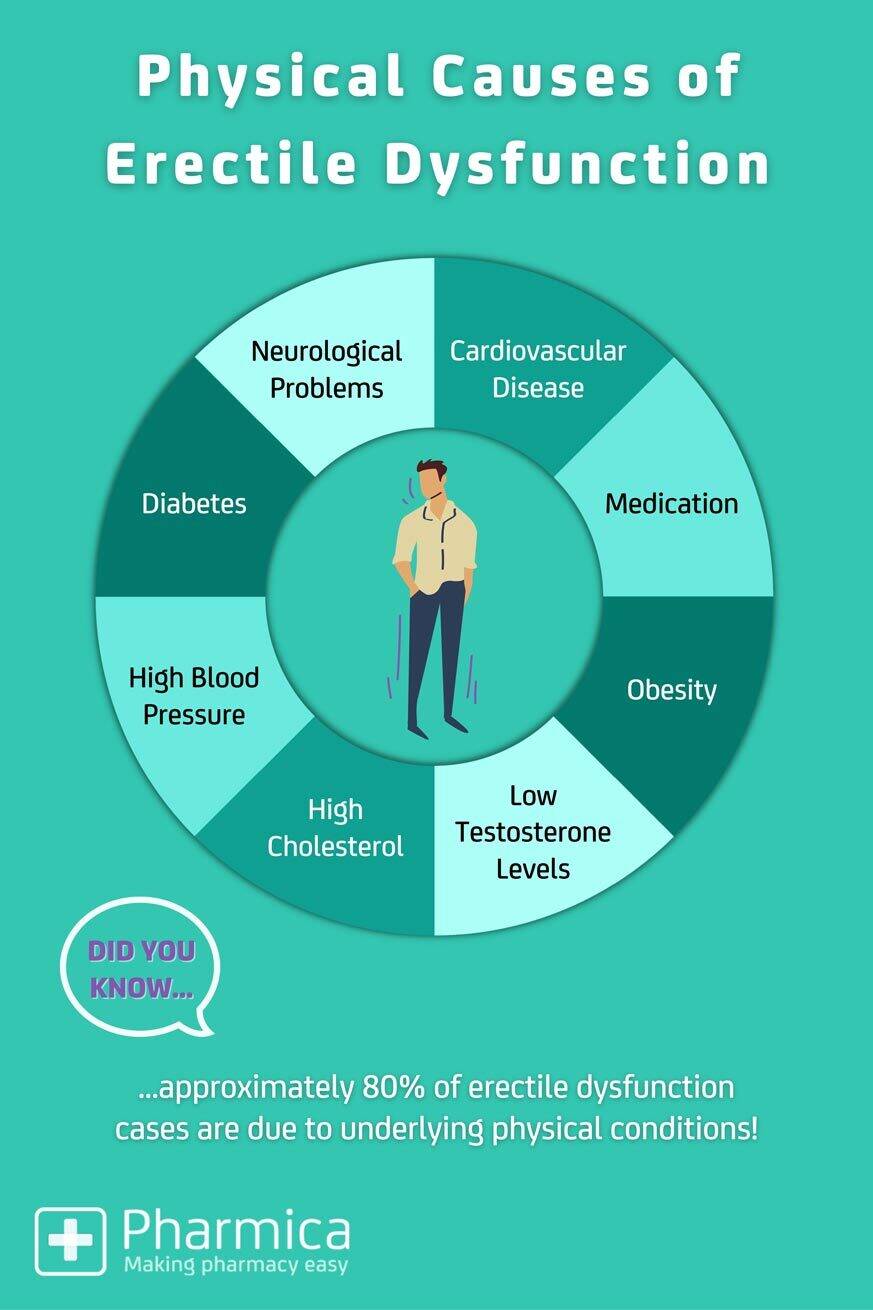
Did you know erectile dysfunction (ED) affects approximately 1 in 5 men in the UK[1]? While it is true that this condition predominantly affects older men, erectile dysfunction in the 20s and even the 30s is more common than you might think - and is often caused by physical factors.
With this in mind, our experts have decided to put together a definitive guide to the physical reasons for erectile dysfunction and potential ways to mitigate them to help with overcoming this common and often temporary issue.
What counts as a physical cause of erectile dysfunction (ED)?
The physical causes of erectile dysfunction in men refer to physiological issues that cause ED and its symptoms. For instance, obesity is a physical cause of erectile dysfunction because it has been found to lower testosterone (a physiological issue that causes erectile dysfunction).
This is different from the psychological causes of erectile dysfunction which refer to mental conditions or triggers for erectile dysfunction. For example, stress is a psychological erectile dysfunction cause as it disrupts the affected person's mental state, causing them to experience erectile dysfunction.

Lifestyle-related physical ED causes
High cholesterol diet
High cholesterol diets cause atherosclerosis - the narrowing of the blood vessels. As cholesterol builds on the lining of the arteries, blood flow gets restricted, making it difficult to achieve and keep an erection[2].
Fast foods such as burgers and fried chicken contain a high level of saturated fat that can increase blood cholesterol levels. This is also the case with fatty meats like bacon and sausages as well as canned tuna, egg yolks, and creamy dairy products like butter and cheese.
Given the correlation between high cholesterol and erectile dysfunction, we recommend cutting back on the aforementioned foods to lower the body’s cholesterol levels and reduce the likelihood of having an erection problem.
Alcohol consumption
Many people assume that drinking alcohol helps with being confident and performing in bed. In reality, alcohol causes erectile dysfunction as it interferes with the brain’s ability to redirect blood to the penis[3].
Limiting alcohol consumption - especially if you anticipate having sex later in the day - can increase your chances of avoiding erection problems.
Smoking tobacco
There is empirical evidence to suggest that smoking tobacco damages blood vessels over time. If blood vessels around the genital area are damaged, arteries in the penis aren’t able to expand during arousal, causing erectile dysfunction.
Quitting smoking has been shown to gradually lower the presence of harmful tobacco chemicals that cause impotence.
Recreational Drugs
Numerous studies have linked erectile dysfunction in young men to taking recreational drugs such as cocaine. For instance, one study found that 66% of men who regularly use cocaine experience erection problems[4].
Therefore, while it may be tempting to take drugs in the belief that it will make sex more pleasurable, avoiding them can help to prevent ED problems.
Medical conditions known to cause ED
Neurological conditions
Neurological conditions such as Alzheimer’s disease, Parkinson’s disease, and multiple sclerosis can negatively impact how the brain communicates with the central nervous system[5]. This can cause erectile dysfunction.
Diabetes
Research shows that some people who have diabetes can develop postural hypotension - otherwise known as low blood pressure. In other words, the link between diabetes and reduced blood flow is often known - but does diabetes cause erectile dysfunction?
The short answer is yes. Diabetes is characterised by high blood glucose (sugar) levels in the body and the excess glucose can damage small vessels that bring blood to nerves in the penis, causing erectile dysfunction.
The probability of diabetes causing erectile dysfunction increases with age because the body secrets less insulin (the hormone responsible for controlling blood sugar levels) as we get older.
Cardiovascular disease
Cardiovascular disease (CVD) is an umbrella term encompassing conditions that impact the heart, veins, and arteries. CVD is one of the primary causes of impotence because it affects blood flow to the genital area.
If you experience symptoms of both poor heart health and erectile dysfunction, we recommend speaking to a pharmacist or GP about ways to improve your cardiovascular functions (such as your resting heart rate and blood oxygen levels) before taking erectile dysfunction medication.
Obesity
Research shows that in many cases, obesity causes erectile dysfunction because both conditions have similar underlying causes and mechanisms[6].
In other words, obese men are highly likely to also be affected by conditions like high cholesterol, cardiovascular complications, and diabetes that are known to cause erectile dysfunction.
If you are experiencing symptoms of both obesity and erectile dysfunction, speak to a pharmacist or a GP about the shared mechanisms between both conditions and how to address them simultaneously.
Hypogonadism (low testosterone)
Researchers have found that hypogonadism (below-average testosterone levels in the body) can lower sexual satisfaction and lead to a reduced sex drive in some men. However, there is limited and inconclusive evidence directly linking low testosterone and ED.
Low testosterone levels can result in an increased proneness to diabetes, obesity, and heart disease - all of which can cause erectile dysfunction. Therefore, if you have low testosterone and experience erectile dysfunction problems, speak to a pharmacist or a GP about addressing these comorbidities.
Additional physical causes of ED
Injuries
Research by the NHS shows that a severe head injury can result in the development of an erectile disorder in up to 25% of all men[7]. Moreover, there is evidence to suggest that injuries to the penis and surrounding area can cause physical erectile dysfunction.
Enlarged prostate
Studies show that some men who have benign prostatic hyperplasia (an enlarged prostate that isn’t cancerous) find it difficult to get an erection. However, there is no evidence to suggest that all men with an enlarged prostate experience erectile dysfunction.
So, can a swollen prostate cause erectile dysfunction? Our experts tend to disagree as the evidence is inconclusive and advise anyone experiencing symptoms of both conditions to consult a GP about it immediately.
Surgery
Experts have found that surgery on certain parts of the body such as the prostate can cause erectile dysfunction if nerves and blood vessels in the area are damaged during the operation. This type of erectile dysfunction naturally subsides once the area where the surgery was performed has healed.
If you experience recurring long-term problems with having and maintaining an erection after undergoing surgery, speak to your GP and the team that handled your surgery about taking erectile dysfunction treatments.
Medication for other conditions
Certain treatments and medications may make erections more difficult to obtain, including antidepressants, beta-blockers, and selective serotonin uptake inhibitors[8].
If you experience erectile dysfunction while taking treatments for the above-mentioned conditions, we recommend consulting a GP.
Overcome erectile dysfunction using clinically proven treatments
At Pharmica, we always do our utmost to maximise patient care and convenience, which is why we provide remote consultations for erectile dysfunction and deliver all treatments using discreet packaging.
With over a million patients served and more than 160,000 reviews, we’re at the forefront of revolutionising the online pharmacy experience in the UK.
Explore our full range of treatments today.